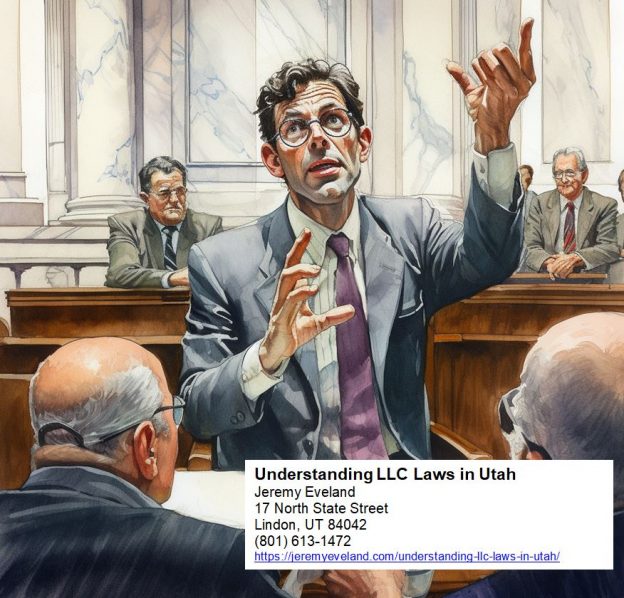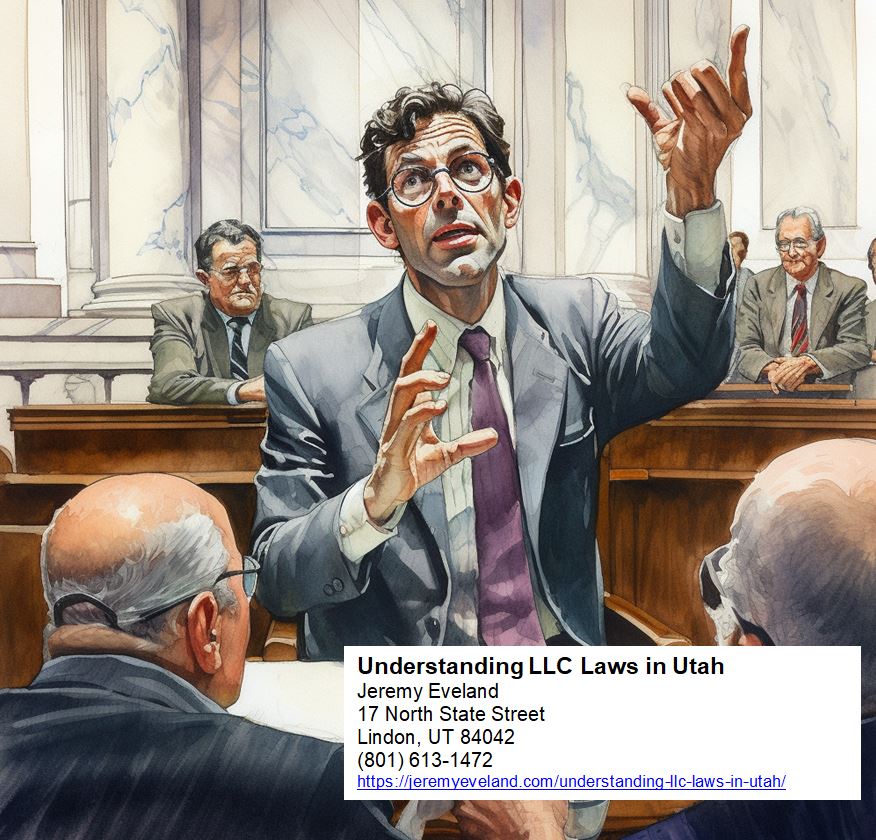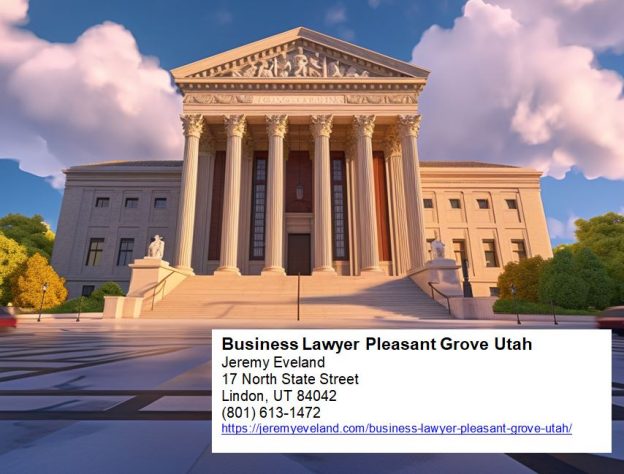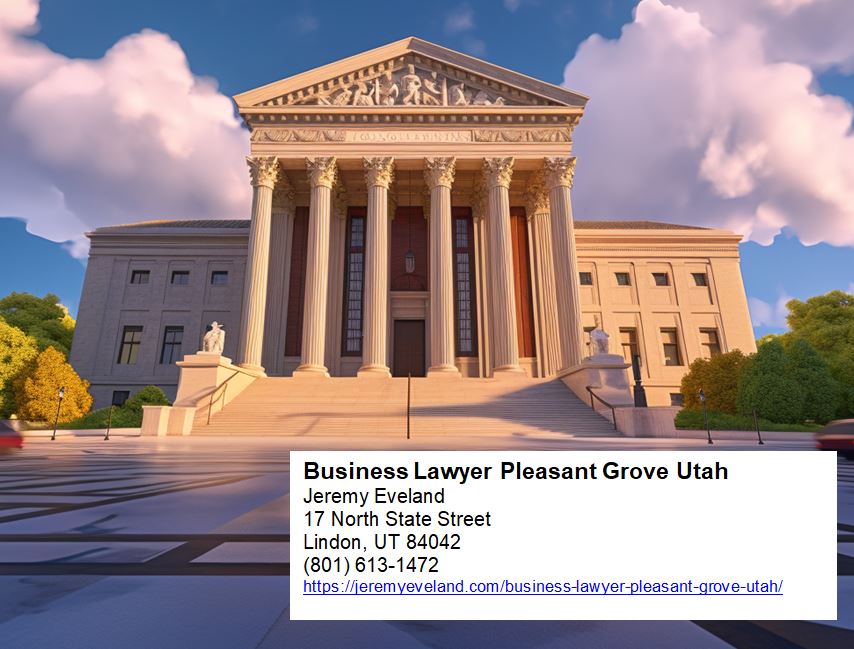Business Lawyer South Salt Lake Utah
Navigating the legal landscape of business in South Salt Lake, Utah can be a daunting task. You're not just managing your day-to-day operations but also ensuring compliance with ever-changing state and federal regulations. That's where a seasoned business lawyer comes into play. These professionals offer invaluable guidance on contract drafting and review, employment law, intellectual property protection, litigation support, and more.
If you're setting up a new venture or maintaining an existing one, it's crucial to understand the legal implications of your decisions. A reliable business lawyer will ensure that all your contracts are legally sound and protect your interests. They'll guide you through complex employment laws to avoid costly lawsuits. And when it comes to protecting your unique ideas or products, they've got you covered with patent, trademark, and copyright law expertise. With their help, you'll master the ins-and-outs of business law in no time!
Key Takeaways
- Business lawyers in South Salt Lake, Utah help businesses navigate red tape and ensure compliance with environmental regulations and labor laws.
- They mitigate potential risks and liabilities for businesses.
- Business lawyers stay updated on evolving legislation and advise on necessary changes.
- They offer comprehensive services for trademark protection, copyright protection, and patent protection to safeguard brand identity, original works, and innovation.
Contract Drafting and Review
Drafting and reviewing contracts in South Salt Lake, Utah is like navigating a complex maze – it's crucial to have a skilled business lawyer on your side to avoid potential pitfalls. From employment agreements to commercial leases, contract drafting is an integral part of doing business in this increasingly competitive environment. A proficient business lawyer can provide valuable insights into the intricacies of the local business law landscape, ensuring that every clause in your contracts aligns with both your interests and the latest regulations. With their legal services at your disposal, you can confidently proceed with transactions knowing that all potential risks have been sufficiently mitigated.
When it comes to contract review, having a seasoned professional by your side becomes even more critical. It's not just about understanding what's written on paper; it's also about discerning what isn't but could or should be there for complete protection of your interests. Your South Salt Lake Utah business lawyer will meticulously scrutinize every detail of the contract – from its language and terms to its implications under existing laws.
Not only does this help you understand the commitments you're making or accepting, but it also ensures that there are no unfavorable clauses hidden in legal jargon or fine print. Contractual disputes often arise from misunderstandings or oversights during the contract review stage; having expert guidance helps prevent such costly issues down the line.
The role of a competent business lawyer extends beyond just drafting and reviewing contracts; they also serve as strategic advisors who help shape your organizational decisions through a legal lens. Their proficiency in comprehending multifaceted legal matters linked with running a company makes them indispensable players within any successful enterprise operating in South Salt Lake Utah.
Next up on our agenda is another crucial area where businesses need expert assistance – employment law guidance. This subject brings its own set of challenges and complexities which require adept handling by knowledgeable professionals well-versed in both state-specific regulations and federal labor laws.
Employment Law Guidance
Navigating the tangled web of employment law can be tricky, that's why it's crucial to get proper guidance to ensure fair treatment and a harmonious workplace. A business lawyer in South Salt Lake, Utah, can provide you with invaluable advice and representation in all matters related to employment law. These lawyers are seasoned professionals who understand the complexities of both federal and state regulations governing work environments. They offer comprehensive legal counsel on a variety of issues including wage disputes, discrimination claims, occupational safety issues, and much more.
When dealing with employment law matters, it's essential not only to comprehend current laws but also keep up-to-date with any changes. The attorneys in South Salt Lake are well-versed in these developments as they occur and can help you navigate them effectively. Whether you need advice on drafting employee contracts or handling disciplinary procedures correctly without falling foul of the legislation, their expertise is invaluable. They work diligently not just to protect your rights but also to prevent potential legal disputes from arising.
Having experienced legal counsel by your side goes beyond addressing immediate concerns; it involves proactive planning for future scenarios too. Business lawyers in South Salt Lake can assist you with developing effective policies and practices that comply with employment law guidelines while promoting a positive working environment. This approach helps minimize risks associated with non-compliance such as costly lawsuits or damage to your firm's reputation.
In this dynamic field of law where changing regulations could impact daily operations significantly, it pays to have an expert at hand offering informed advice tailored specifically for your business needs. As we transition into our next topic about intellectual property protection, remember that having the right legal support could mean safeguarding not just your company's workforce but its innovative ideas too.
Intellectual Property Protection
Protecting your intellectual property is crucial, as it safeguards the unique ideas and creations that set your company apart. In Salt Lake City, Utah, a business lawyer can act as a protective barrier between your innovations and those who may attempt to exploit them without proper authorization. Intellectual property protection extends to various aspects such as patents, trademarks, copyrights, and trade secrets. Each of these tools provides a different level of protection for your business's creative assets.
The table below provides an outline on some key considerations when protecting intellectual property with the help of a skilled business lawyer in South Salt Lake City:
| Type | Definition | Legal Protection |
|---|---|---|
| Patent | Grants exclusive rights to an invention | Prevents others from making, using or selling invention |
| Trademark | Protects brand names and logos | Deters confusion in marketplace |
| Copyright | Gives exclusive rights to original works of authorship | Prevents unauthorized reproduction |
| Trade Secret | Covers confidential information that gives a competitive advantage | Prohibits misappropriation |
Understanding what each tool covers will guide you in strategically safeguarding valuable elements within your company. For example, if you've developed a product with unique features not found elsewhere on the market, obtaining patent protection would prevent competitors from producing similar items – preserving your edge in the industry. Alternatively, copyright might be appropriate if you've created original content or software; this could deter unauthorized copying or distribution.
Choosing the right form of intellectual property protection requires careful consideration based on what best fits your needs and long-term business goals. It's always recommended that you consult with an experienced Utah business lawyer before proceeding with applications for patents or trademarks or setting up safeguards around trade secrets. This ensures you're fully aware of all potential legal implications related to protecting your intellectual assets.
Ready to dive deeper into how legal professionals can support businesses beyond just asset protection? Let's explore how litigation support can be another critical service offered by seasoned lawyers in South Salt Lake City.
Litigation Support
When you're tangled up in a legal dispute, having top-notch litigation support can be an absolute game-changer. A proficient law firm equips you with experienced business law attorneys who understand the intricacies of your case and strive to formulate strategies that cater to your specific needs. These small business lawyers bring their extensive knowledge and legal experience to the table, helping you navigate through every stage of litigation, from pre-trial investigations to final resolution. Their skills are not confined merely to courtroom battles; they also excel at negotiation techniques, which can often lead to an amicable settlement without even stepping into court.
The role of a competent lawyer extends beyond simply arguing cases. They serve as advisors who can help you identify potential risks or areas of concern before they evolve into significant problems. In South Salt Lake City, Utah, for instance, there's no shortage of law firms offering such services right from their Lake City office. But what sets these professionals apart is their dedication towards understanding your business and its unique challenges coupled with their commitment towards delivering results.
Litigation isn't just about winning or losing a case; it's about safeguarding your company's reputation and ensuring its longevity in the market. This goes hand-in-hand with other aspects like contract management, compliance issues etc., which are equally crucial for smooth operations. Business law attorneys work diligently on all these fronts while keeping you updated at every step so that informed decisions can be made promptly.
In navigating this complex world of litigation, remember that it's best not done alone but rather alongside seasoned professionals who know the terrain well. The goal should always be minimizing risk while maximizing opportunities for growth and success in a legally compliant manner. Next up on our journey is taking a deeper dive into one such critical aspect: compliance with regulations – because when it comes to running a successful enterprise, it's not just about meeting standards but exceeding them!
Compliance with Regulations
You'd be amazed to know that according to the U.S. Small Business Administration, small businesses spend 36% more per employee on regulatory compliance than larger firms. This is where a business lawyer in South Salt Lake, Utah can prove invaluable. With an understanding of both city and federal laws, these attorneys can help navigate the labyrinth of red tape that often encumbers businesses. Whether it's adhering to environmental regulations or labor laws, your business lawyer will ensure you're not just complying with regulations but thriving despite them.
Adept at dissecting complex legal jargon and translating it into actionable steps for your company, business lawyers are a critical asset for any firm looking to stay ahead of compliance issues. They offer comprehensive services that extend beyond litigation support; they also provide guidance during business transactions such as mergers and acquisitions, ensuring all actions align with applicable law and regulations. By doing so, they mitigate potential risks before they become real liabilities.
However, their role doesn't stop there. In today's fast-paced business environment where rules change rapidly and new ones spring up regularly, staying compliant requires vigilance and proactive planning. Your attorney serves as a sentinel who keeps abreast of evolving legislation at the city level down to specific industry regulations affecting your operations. Armed with this knowledge, they'll advise you on necessary changes or adjustments in your processes or practices ensuring continued compliance with regulations.
As we've seen, retaining the services of seasoned business lawyers in South Salt Lake City guarantees not only survival but prosperity in today's stringent regulatory climate. But remember: while these professionals are experts at keeping you compliant with existing laws and policies – their expertise isn't confined within those boundaries alone! Up next is another crucial area where their skill set proves indispensable: maneuvering through the intricate world of trademark protection.
Trademark Protection
Navigating the intricate world of trademark protection can often feel like a game of chess, where every move counts and one wrong step could cost you dearly. As business owners, it's imperative to safeguard your brand identity from potential infringement and misuse. Our firm offers comprehensive services that ensure your brand remains exclusive to you. We practice due diligence in studying the market landscape for any possible conflicts and guide our clients through the complicated process of registration.
Our team provides an array of services that encompass all stages of trademark protection:
- Comprehensive search and analysis to identify potential conflicts.
- Assistance with filing applications for trademark registration.
- Representation in case of oppositions or cancellations actions.
- Regular monitoring for infringement activities.
- Legal advice on enforcement strategies and litigation if required.
This approach gives our clients peace of mind knowing their trademarks are well-protected. Every aspect is meticulously handled to ensure absolute compliance with regulations, thereby reducing risk exposure. Moreover, we strive to empower you as a business owner by providing knowledge about legal jargon related to trademark laws so that you can make informed decisions about your brand's future.
Being proactive in securing your intellectual property rights is crucial in today's competitive marketplace. With our firm at your side, rest assured that we will diligently defend your interests against any form of violation. Our commitment extends beyond mere representation; we view each client's success as a reflection of ours hence why we leave no stone unturned when it comes to protecting what's rightfully yours.
Before moving onto the subsequent section about copyright protection, it's worth noting that these two areas – while closely intertwined – are distinct elements within intellectual property law. Understanding this distinction is key in ensuring total security for all aspects of your business' unique identity.
Copyright Protection
In today's digital age, it's crucial to secure your original works with solid copyright protection. As a business owner, this is not something you can afford to neglect. Copyright protection safeguards your rights over original work like books, music, art or even software programs – any product of your creativity that you've painstakingly developed for the marketplace. Partnering with a competent business lawyer in South Salt Lake, Utah can ensure that you're taking all the necessary steps towards securing these rights and protecting your intellectual property.
Understanding the nuances of copyright law can be complex. It involves knowing which works can be copyrighted, how to register a copyright officially and what kind of legal recourse is available if someone infringes on these rights. Here's where a seasoned attorney comes into play; their expertise in corporate governance and understanding of legal needs specific to businesses will guide you through this process.
| Aspect | Why Important? | Role of Business Lawyer |
|---|---|---|
| Identifying Copyrightable Work | Ensuring only original work gets protected. | Advice on IP laws & regulations |
| Registration Process | Official documentation adds credibility. | Help with paperwork & deadlines |
| Infringement Issues | Protecting against unauthorized use. | Legal representation & lawsuit filing |
| License Agreements | Monetizing through third-party use. | Drafting & negotiating terms |
The role of a business lawyer extends well beyond just completing formalities for copyright registration; they help navigate the complexities around infringement issues and license agreements as well. A good lawyer understands your business needs and aligns them with legal strategies designed to protect and leverage your intellectual assets effectively.
Navigating through the labyrinthine world of copyrights does not have to be overwhelming when equipped with proper guidance from an experienced professional. The right support can give you peace of mind as a business owner while also ensuring that your interests are safeguarded at all times. This level of vigilance then sets up an environment conducive for innovation without fear – setting the stage perfectly for exploring other aspects such as patent protection.
Patent Protection
Moving onto patent protection, imagine the thrill of being the first to develop a groundbreaking product or process, only to have your hard-earned invention swiped by competitors because you overlooked this crucial aspect. This is where a business lawyer in South Salt Lake, Utah comes into play. They can help you navigate through the complex legal landscape of patents and ensure that your innovation gets the protection it deserves. A patent grants you exclusive rights to produce, sell, and use your invention for a certain period of time.
At its core, patent protection serves as an essential shield for your business entity. Whether you're operating as a sole proprietorship or a corporation, securing your intellectual property should be one of your top priorities. It's not just about preventing others from copying or stealing what's rightfully yours – it's also about maintaining and enhancing your competitive edge in today's fast-paced market environment.
Here are some key reasons why you might need patent protection:
- To prevent others from exploiting your invention: Once granted, no other individual or business entity can legally reproduce, sell or import your patented product without consent.
- In case someone does infringe on these rights, having a patent gives you grounds to sue them and potentially recover damages.
- To attract investors: A robust portfolio of patents can significantly boost investor confidence in your venture.
- Investors often view patents as solid proof of an enterprise's innovative capabilities and growth potential.
- To gain market exclusivity: With effective patent protection secured by experienced South Salt Lake Utah business lawyers consultation services, you can enjoy exclusivity in the marketplace for up to 20 years depending on the type of patent granted.
Patent law is complicated but with guidance from knowledgeable professionals who uphold high ethical standards such as those found at South Salt Lake Utah firms; inventors and businesses alike can secure their place within their respective markets. Remember that every successful innovation begins with an idea; protecting that idea ensures it remains yours alone. You worked hard on developing something new; don't let anyone else take credit for it! Don't forget – proper planning today will protect tomorrow's profits!
Frequently Asked Questions
What is the typical cost of hiring a business lawyer in South Salt Lake, Utah?
The cost of hiring a business lawyer in South Salt Lake, Utah can vary greatly based on several factors. Typically, you might expect to pay anywhere from $350 to $950 per hour, depending on the lawyer's experience level and the complexity of your legal needs. Some attorneys may also offer flat fee services for certain tasks, which could range from hundreds to thousands of dollars. Keep in mind that costs can also increase if your case goes to court or requires extensive research and documentation. It's crucial to discuss all potential fees upfront during your initial consultation so there are no surprises later on. Remember, investing in a competent legal counsel could save you significant money and stress down the line by ensuring your business is legally sound right from the start.
How long does it usually take for a business lawyer to resolve a case in South Salt Lake, Utah?
The duration it takes for a business lawyer to resolve a case can vary significantly depending on numerous factors. It's hard to provide an exact timeframe, but litigation generally can take anywhere from several months to a few years. If your case involves complex issues, such as intellectual property disputes or intricate contract law, the resolution process could be lengthier. On the other hand, relatively straightforward matters like forming LLCs or drafting contracts may only require a few weeks of work. Of course, elements such as court schedules and negotiation processes also influence this timeline. The key is to maintain constant communication with your lawyer throughout the process for accurate updates on how your case is progressing.
How can a business lawyer help in the process of business formation and structuring in South Salt Lake, Utah?
You're eager to launch your new venture, but the complexities of business formation and structuring can be daunting. A business lawyer can be instrumental at this stage. They'll guide you through choosing the most suitable structure for your business, whether it's a sole proprietorship, partnership, LLC, or corporation – each has its own legal implications and tax benefits. This professional will also help you understand Utah-specific regulations that could impact your operation. They'll ensure all necessary paperwork is filed correctly and timely with the Secretary of State, safeguarding your fledgling venture from potential legal complications down the road. Moreover, they can set up well-defined agreements among partners or shareholders to avoid future disputes. Their role doesn't end here; they continue providing counsel as your firm evolves and grows over time. With their assistance, you'll navigate the intricacies of business law more confidently and focus on what matters most – running your enterprise successfully.
What should one look for when choosing a business lawyer in South Salt Lake, Utah?
When choosing a business lawyer, you should first consider their experience and expertise in the area of business law. Make sure they're well-versed in aspects such as business formation, contracts, intellectual property rights, labor laws and taxation. It's also essential that they possess strong negotiation skills to protect your interests effectively. Secondly, look at their reputation within the community; reviews or testimonials from previous clients can provide valuable insights into their professionalism and reliability. Additionally, ensure they are responsive communicators who will keep you updated on any developments pertaining to your case. Lastly, evaluate their fee structure – it should be transparent and reasonable without hidden costs. Your lawyer should be not just an advisor but a partner in your business journey who understands your needs and goals while providing practical legal solutions.
Can a business lawyer in South Salt Lake, Utah also provide consultation for personal legal issues?
Absolutely, a business lawyer can certainly provide consultation for personal legal issues as well. However, it's important to keep in mind that while many lawyers have broad knowledge in various areas of law, they typically specialize in one specific area. Just like you wouldn't hire a divorce attorney to handle your tax audit, you might not want your business lawyer handling personal matters unless they have the relevant experience. Therefore, if you're dealing with a personal legal issue outside of their expertise, they may be able to guide you or refer you to another trusted professional who specializes in that field. It's all about finding the right fit for your unique situation and needs.
Conclusion
You're standing at the helm of your business ship. You've navigated rough seas of contract drafting, employment law issues, intellectual property protection, and more. But you're not alone. Your South Salt Lake Utah business lawyer is your trusted compass, guiding you through each legal challenge.
Remember that protecting your brand's identity with trademark, copyright and patent protections is akin to safeguarding precious cargo. A proactive approach ensures smooth sailing ahead in the often tumultuous waters of business legality.
Areas We Serve
We serve individuals and businesses in the following locations:
Salt Lake City Utah
West Valley City Utah
Provo Utah
West Jordan Utah
Orem Utah
Sandy Utah
Ogden Utah
St. George Utah
Layton Utah
South Jordan Utah
Lehi Utah
Millcreek Utah
Taylorsville Utah
Logan Utah
Murray Utah
Draper Utah
Bountiful Utah
Riverton Utah
Herriman Utah
Spanish Fork Utah
Roy Utah
Pleasant Grove Utah
Kearns Utah
Tooele Utah
Cottonwood Heights Utah
Midvale Utah
Springville Utah
Eagle Mountain Utah
Cedar City Utah
Kaysville Utah
Clearfield Utah
Holladay Utah
American Fork Utah
Syracuse Utah
Saratoga Springs Utah
Magna Utah
Washington Utah
South Salt Lake Utah
Farmington Utah
Clinton Utah
North Salt Lake Utah
Payson Utah
North Ogden Utah
Brigham City Utah
Highland Utah
Centerville Utah
Hurricane Utah
South Ogden Utah
Heber Utah
West Haven Utah
Bluffdale Utah
Santaquin Utah
Smithfield Utah
Woods Cross Utah
Grantsville Utah
Lindon Utah
North Logan Utah
West Point Utah
Vernal Utah
Alpine Utah
Cedar Hills Utah
Pleasant View Utah
Mapleton Utah
Stansbury Par Utah
Washington Terrace Utah
Riverdale Utah
Hooper Utah
Tremonton Utah
Ivins Utah
Park City Utah
Price Utah
Hyrum Utah
Summit Park Utah
Salem Utah
Richfield Utah
Santa Clara Utah
Providence Utah
South Weber Utah
Vineyard Utah
Ephraim Utah
Roosevelt Utah
Farr West Utah
Plain City Utah
Nibley Utah
Enoch Utah
Harrisville Utah
Snyderville Utah
Fruit Heights Utah
Nephi Utah
White City Utah
West Bountiful Utah
Sunset Utah
Moab Utah
Midway Utah
Perry Utah
Kanab Utah
Hyde Park Utah
Silver Summit Utah
La Verkin Utah
Morgan Utah
Business Lawyer South Salt Lake Utah Consultation
When you need help from a South Salt Lake Utah Business Attorney, call Jeremy D. Eveland, MBA, JD (801) 613-1472 for a consultation.
Jeremy Eveland
17 North State Street
Lindon UT 84042
(801) 613-1472
Related Posts
How to Calculate Overtime Pay in Utah
Business Lawyer Cottonwood Heights Utah
Understanding Utah’s Consumer Protection Laws
Comprehensive Guide To Hiring A Business Lawyer
Business Lawyer Springville Utah
Mergers and Acquisitions from a Legal Perspective
Business Lawyer Eagle Mountain Utah
Understanding Anti-Trust Laws in Utah
Business Lawyer Cedar City Utah
Understanding LLC Laws in Utah
Business Lawyer Kaysville Utah
Understanding Utah’s Non-Profit Laws
Business Lawyer Clearfield Utah
Business Lawyer American Fork Utah
How To Handle Customer Complaints In Utah
Business Lawyer Saratoga Springs Utah
The Role of Business Law in Protecting Minority Shareholder Rights
What Are The 4 Different Types of Business Law?
Business Lawyer Washington Utah
Business Lawyer South Salt Lake Utah
[geocentric_weather id=”64dc2fbf-11ca-4397-b04c-423c376f646d”]
[geocentric_about id=”64dc2fbf-11ca-4397-b04c-423c376f646d”]
[geocentric_neighborhoods id=”64dc2fbf-11ca-4397-b04c-423c376f646d”]
[geocentric_thingstodo id=”64dc2fbf-11ca-4397-b04c-423c376f646d”]
[geocentric_busstops id=”64dc2fbf-11ca-4397-b04c-423c376f646d”]
[geocentric_mapembed id=”64dc2fbf-11ca-4397-b04c-423c376f646d”]
[geocentric_drivingdirections id=”64dc2fbf-11ca-4397-b04c-423c376f646d”]
[geocentric_reviews id=”64dc2fbf-11ca-4397-b04c-423c376f646d”]




















